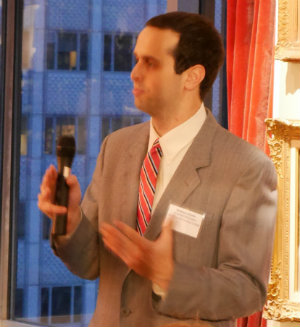 Hartford Trustees Kathryn D. Wriston, left, and Lile R. Gibbons, at a recent reception honoring them as personal supporters of the MSTAR program.
Hartford Trustees Kathryn D. Wriston, left, and Lile R. Gibbons, at a recent reception honoring them as personal supporters of the MSTAR program.Over the past 20 years, the Medical Student Training in Aging Research (MSTAR) program—a summer internship that draws physicians-in-training into the field of geriatrics and aging research—has supported more than 2,000 medical students.
We celebrated the program’s 20th anniversary and its remarkable record last week with a reception honoring John A. Hartford Foundation Trustees and other individuals who have personally donated to the sustainability of this initiative, administered by the American Federation for Aging Research (AFAR).
And to ensure that the program continues for another 20 years, we invite you to become a supporter of MSTAR.
While MSTAR’s partnership with the National Institute on Aging (NIA) provides much-needed funding for student stipends at a handful of medical schools serving as national training centers, philanthropic funding is essential for AFAR to coordinate the program, place more students at additional training sites, and support student travel to the annual American Geriatrics Society meeting, where MSTAR scholars present their research and interact with leaders in the field.
While foundations like ours, MetLife Foundation, and the Jean and Louis Dreyfus Foundation play a major funding role, the program is looking for long-term sustainability by building up a base of individuals who can contribute to the program’s future through the MSTAR Fund.
If you were ever an MSTAR scholar, a mentor to an MSTAR, or simply believe that we need more physicians who understand and can address the unique needs of older adults, we hope you will become an MSTAR supporter.
I mentioned the MSTAR program’s remarkable record: nearly 25 percent of participants follow a career path that has a particular focus on older adults, either in geriatrics or other specialties. These MSTAR scholars touch the lives of thousands of patients and influence their colleagues to provide better care for older people. The return on investment for those who donate to the program is huge.
 MSTAR student Matthew Schelke, from Weill Cornell Medical College, speaks during the reception.
MSTAR student Matthew Schelke, from Weill Cornell Medical College, speaks during the reception.At our reception last week, we specially honored retired Hartford Trustee Kathryn D. Wriston, who has been a tireless champion of the MSTAR program. Through her donations, she has sponsored four MSTAR scholars, including Matthew Schelke, a student at Weill Cornell Medical College. During his presentation at the end of his summer internship this year, Schelke made an eloquent case for how clinical research—such as that on disease burden and stressful stimuli that affect the health of older patients—can work in concert with basic science research like his on the cellular and molecular pathways related to stress.
And through Mrs. Wriston’s example and encouragement, she has inspired other Hartford Trustees and individuals to support the program and its scholars.
We sincerely thank Mrs. Wriston, our other Hartford Trustees, and all of the individuals who have contributed to the MSTAR Fund and sponsored a future physician who will potentially launch a career in aging research and geriatrics, and who will certainly be better prepared to care for older adults as a result of their MSTAR experience.
And thank you for joining in this support.
[gallery columns="2" link="file" ids="9087,9088,9089,9090"]
